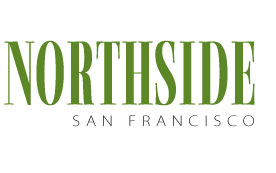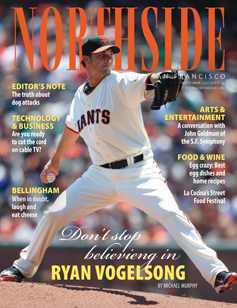
Secretary of State Hillary Clinton talks with
Commonwealth Club vice president Greg Dalton
about improving the effectiveness of American diplomacy
photo: Sonya Abrams
Presidential cabinet secretaries work from the road a lot, and they must have a good reason for doing so or they wouldn’t leave their comfy offices in Washington, D.C.
During the fall midterms campaign, we heard commentators – and even the president himself – talk about the need for President Obama to get out of Washington, presumably all the better to run the country from someone’s backyard or a small-town diner. That was campaign malarkey, of course. The president’s work is in Washington, but his bosses – his constituents – are 310 million Americans, so it makes good political and job-security sense for him to get out of the office.
Staying in touch with constituents is one thing, though; doing actual work is another. The president’s actual work is arguably best performed within the nation’s capital. But what is true of a president might not be true of his cabinet secretaries. They have only one boss, one constituent: the president. The bureaucracies they lead are based in the nation’s capital, yet much of their actual work can take place elsewhere.
Condoleezza Rice, George W. Bush’s second-term secretary of state, said as much in an October appearance at The Commonwealth Club. “I flew a million miles as secretary of state. You’re always getting off the plane hoping that you’re not going to say that you’re in a country that you’re not actually in, because you’re sometimes not quite sure where you are,” she joked. But that heavy travel schedule isn’t all public glad-handing. With nearly every country turning to the State Department to get help with regional problems, “it is the address for almost every problem in the world,” according to Rice.
Just three days before Rice spoke in October, the current secretary of state, Hillary Clinton, pretty much made the same point when she addressed 1,400 people at the Commonwealth Club in San Francisco. She even caught herself in one of those momentary confusions about location, starting a sentence with: “When I was in London – no, where was I? – Brussels yesterday …”
Clinton’s speech, in only the third U.S. city she’s spoken in since taking control of the State Department, was also to her largest audience since she appeared at her party’s convention during the 2008 campaign. It would be wrong to think she was just taking a break from her job to come to the Bay Area and speak to the public. Cabinet secretaries making public remarks anywhere are doing their jobs just as much as when they are issuing orders to their staffs or meeting with the president.
Clinton particularly wanted to draw Bay Area citizens and technology companies into the diplomatic arena, and she asked them to help with projects ranging from cell phones for third-world women to using Google to map antiquities in danger of being stolen in Iraq.
Clinton can deliver a lot to the president from the road. Richard Wolffe recently wrote on The Daily Beast that her mid-November feat of getting Israel to revive its talks with the Palestinians gave the president a rare “win” in a tough autumn. It came as Obama was returning to the United States following an unsuccessful G20 summit in Korea and a thumping in midterm elections. “President Obama entered the weekend in desperate need of a bit of good news,” wrote Wolffe. “He got some, at long last, on Saturday, thanks in large part to Secretary of State Hillary Clinton, whose marathon negotiating session” with Israeli Prime Minister Benjamin Netanyahu produced a breakthrough on another temporary halt to settlements. Had she stayed in Washington and Skyped the prime minister, it is unlikely the peace talks would have been wheeled out of intensive care.
We hope we’ll hear more about the Obama-Clinton work environment when Wolffe describes the inner workings of the Obama White House in his own Commonwealth Club event on Dec. 7.
To complete our cabinet hat trick in October, Treasury Secretary Timothy Geithner spoke to a Commonwealth Club audience down in Silicon Valley just one hour after Rice’s program up in San Francisco.
Cabinet-level public diplomacy was even more obvious in Geithner’s speech. If the Clinton and Rice audiences were largely foreign policy buffs and political supporters, Geithner’s audience contained mostly Silicon Valley business people and financial industry professionals. His program began at 1 p.m. Pacific Daylight Time – which is when trading ends in New York. That was not a coincidence. Financial markets can move considerably as a result of any utterance of a Treasury official, and word of Geither’s comments on the strength of the U.S. dollar, as well as America’s federal deficit and debt, got instant attention from the world’s business press.
Admittedly, it’s rare that we have three current or former secretaries at the Commonwealth Club within a few days of each other. But it does help demonstrate that a presidential administration might be the busiest when the offices of its cabinet secretaries are empty, because their occupants are all on the road.
John Zipperer is vice president of editorial and media at The Commonwealth Club of California, www.commonwealthclub.org.
E-mail: johnz@northsidesf.com








